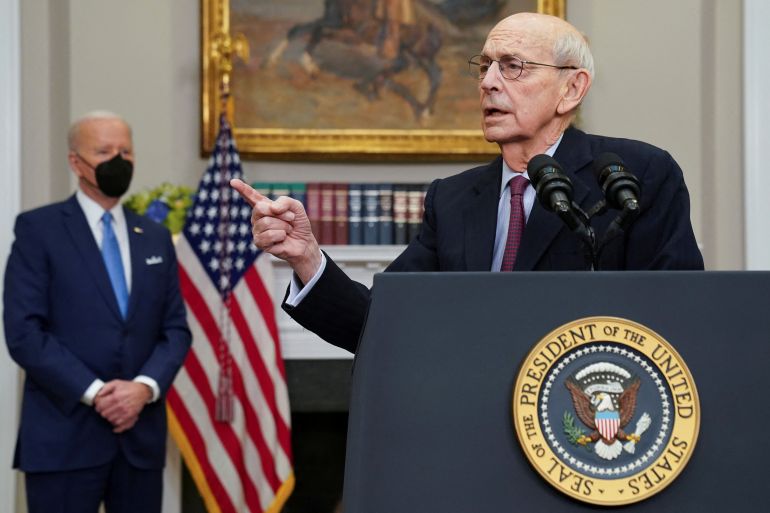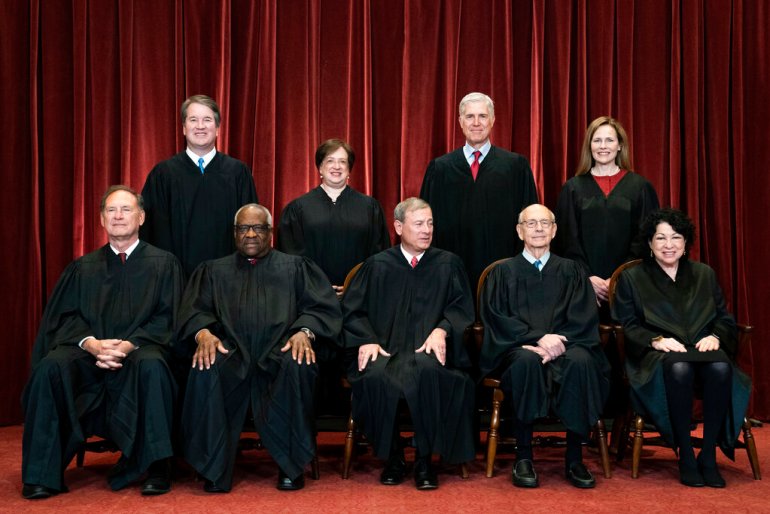US Supreme Court Justice Stephen Breyer announces retirement
President Joe Biden has pledged to nominate a Black woman to the US high court now dominated by conservatives.

United States Supreme Court Justice Stephen Breyer has announced he will retire, giving President Joe Biden an opportunity to nominate a new jurist to the country’s highest court.
In a letter to Biden on Thursday, the 83-year-old justice said his resignation would take effect at the end of the current term, usually in late June or early July, “assuming that by then my successor has been nominated and confirmed”.
Keep reading
list of 4 itemsUS Supreme Court reinstates Trump-era ‘Remain in Mexico’ policy
US Supreme Court hears arguments in Muslim civil rights case
Abortion: Will the US Supreme Court overturn Roe v Wade in 2022?
Breyer described his nearly 28 years on the bench as “challenging and meaningful” and said relations with his colleagues have been “warm and friendly”.
Speaking at the White House on Thursday, Biden praised Breyer’s work as “a leading scholar” and called him “a model of public servant at a time of great division”.
The president repeated an earlier promise that he would nominate a Black woman to the nine-member high court, which would be a first in US history. Biden said he would announce a pick to replace Breyer before the end of February.
“Our process is going to be rigorous, I will select the nominee, worthy of justice Breyer’s legacy of excellence and decency,” Biden said.
The US Supreme Court currently has a 6-3 conservative majority that has taken up cases dealing with major judicial precedents, including on abortion, gun rights and religious liberty.
Replacing Breyer with a liberal jurist – as Biden is almost certain to do – likely would not change the balance on the court. It does, however, preempt a further shift to the right feared by liberal activists in the event Democrats lose to Republicans in upcoming elections.
Supreme Court justices serve lifetime appointments and a replacement to Breyer is likely to serve in the role for decades.
“Justice Breyer has been a pretty reliable vote for how you’d expect a Democratic-appointed justice to vote on those issues, and we could expect someone Biden nominates would vote the same way,” said Kelsi Brown Corkran, a Supreme Court litigator at Georgetown University Law Center.
As such, Biden’s appointment will mean “probably very little” for the court in terms of its overall outcomes and direction,” Corkran told the Reuters news agency.
The abortion and guns cases before the court will be decided before Breyer is expected to step down at the end of the current term.

On abortion, the court’s conservatives seem willing to undermine, or even overturn, the landmark Roe v Wade ruling from 1973 that legalised abortion across the US. On guns, the conservative justices appear poised to expand the right to carry firearms in public.
Earlier this week, the court took up a case to be decided in their next term that could doom university policies considering race in admissions in order to admit more Black and Hispanic students. Conservatives have opposed such affirmative action programmes.
Potential Biden nominees include Ketanji Brown Jackson, a former Breyer law clerk who was confirmed by the Senate last June to serve on an influential US appellate court, and Leondra Kruger, who serves on the California Supreme Court. Sherrilyn Ifill, head of the civil rights group NAACP’s legal team, has also been touted as a potential Biden nominee.
Other Black women on the list of potential candidates are; US District Judge Julianna Michelle Childs, US Appeals Court Judge Candace Rae Jackson-Akiwumi, and US Appeals Court Judge Eunice Cheryl Lee.
The new justice, if confirmed by the Senate, would likely be on the bench for the start of the court’s next term in October, when it will be preparing to hear the university admissions case.
“The members of the six-justice conservative majority know what they think. A new voice on the other side is unlikely to make them rethink their views,” Carolyn Shapiro, a professor at Chicago-Kent College of Law who served as a law clerk under Breyer, told Reuters.
Former President Donald Trump named three new conservative justices to the court during his four-year term as president; Justices Neil Gorsuch, Brett Kavanaugh and Amy Coney Barrett.
Barrett replaced the late liberal Justice Ruth Bader Ginsburg, who died in 2020, shifting the court from a right-leaning 5-4 split to a firmly 6-3 conservative panel.